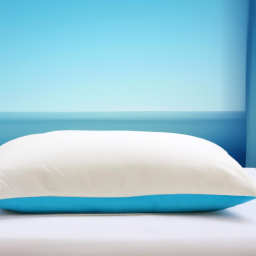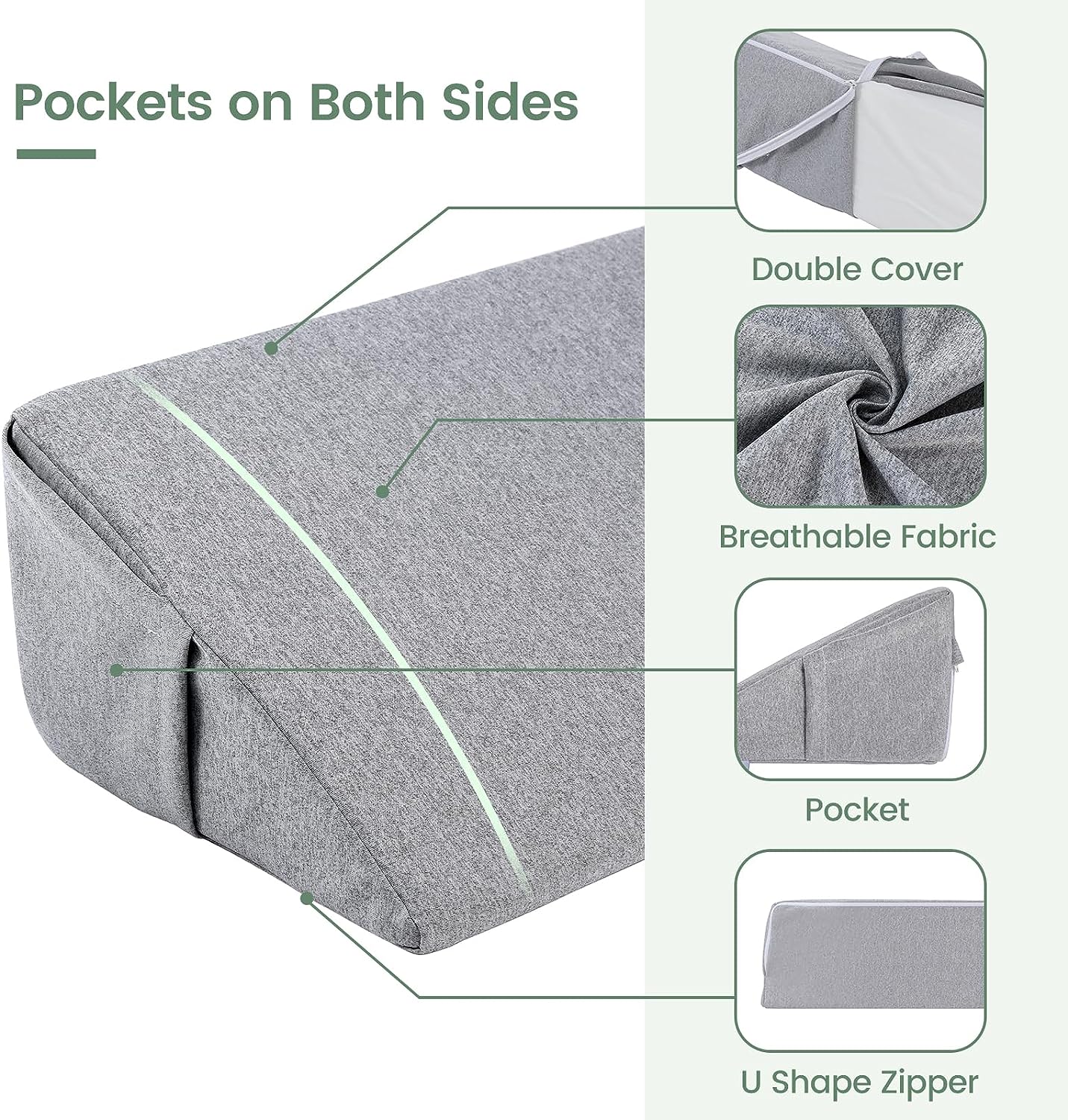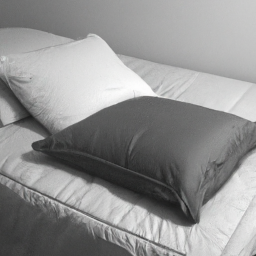If you’re a stomach sleeper seeking a solution to enhance your sleep quality, you might have wondered if wedge pillows are suitable for your sleeping position. Look no further, as we explore the most frequently asked questions about wedge pillows and their compatibility with stomach sleeping. Let’s delve into the world of Wedge Pillows and discover if they can provide the comfort and support you need for a good night’s rest.
Benefits of Wedge Pillows
Improves digestion and reduces acid reflux
wedge pillows are known for their ability to improve digestion and reduce the symptoms of acid reflux. When you sleep on a traditional pillow, your body is in a flat position, which can cause stomach acid to flow back up into your esophagus. This can lead to heartburn, indigestion, and discomfort. However, when you use a wedge pillow, your upper body is slightly elevated, which helps to keep the acid in your stomach, reducing the chances of it flowing back up.
Relieves snoring and sleep apnea
Snoring can not only disturb your own sleep but also affect your partner’s sleep quality. Wedge pillows can help alleviate snoring and sleep apnea by positioning your head and neck in a way that keeps your airways open. By elevating your upper body, a wedge pillow helps to reduce the likelihood of your tongue and throat muscles collapsing and obstructing your airway. This can lead to a quieter night’s sleep and potentially reduce the severity of sleep apnea symptoms.
Alleviates back and neck pain
If you frequently wake up with back or neck pain, a wedge pillow may be your solution. The incline provided by a wedge pillow helps to align and support your spine, reducing the strain on your back and neck muscles. This can be particularly beneficial for individuals who suffer from chronic conditions such as herniated discs or arthritis. By providing proper support, a wedge pillow can help alleviate pain and promote a more restful night’s sleep.
How do Wedge Pillows Work?
Elevates the upper body
The main function of a wedge pillow is to elevate your upper body, whether you are lying on your back or your side. By raising your upper body, a wedge pillow helps to keep your esophagus above your stomach, preventing stomach acid from flowing back up. It also opens up your airways, allowing for easier breathing and reducing the risk of snoring or sleep apnea.
Keeps the airways open
Wedge pillows are particularly effective in keeping your airways open, especially if you tend to sleep on your back. When you sleep flat on your back, there is a higher chance of your tongue and throat muscles collapsing, which can obstruct the airway and result in snoring or sleep apnea. However, the incline provided by a wedge pillow helps to counteract this by keeping your head and neck in an elevated position, preventing any obstructions.
Reduces pressure points
Sleeping on a firm mattress or a traditional pillow can often lead to pressure points, which can cause discomfort and even pain. However, when you use a wedge pillow, the incline allows for more even distribution of your body weight, reducing the amount of pressure placed on certain areas. This can help alleviate pressure points and lead to a more comfortable and restful sleep.
Challenges for Stomach Sleepers
Increased risk of back and neck pain
While many people find comfort in sleeping on their stomachs, this sleep position can increase the risk of developing back and neck pain. This is primarily because sleeping on your stomach can strain the natural alignment of your spine, putting pressure on your lower back and neck. Over time, this can lead to chronic pain and discomfort.
Potential for respiratory issues
stomach sleepers also have a higher potential for respiratory issues during sleep. When you sleep on your stomach, it can restrict your ability to fully expand your chest and take deep breaths. This can lead to shallow breathing, which may cause oxygen deprivation and ultimately disrupt your sleep.
Digestive problems
Sleeping on your stomach can also contribute to digestive problems. The pressure placed on your stomach can interfere with the normal flow of digestion, potentially leading to issues such as acid reflux or heartburn. This can not only be uncomfortable but also disturb your sleep.
Can Stomach Sleepers Benefit from Wedge Pillows?
Positioning challenges for stomach sleepers
While wedge pillows offer numerous benefits for certain sleep positions, they may not be the most suitable option for stomach sleepers. The incline provided by a wedge pillow conflicts with the natural curvature of the spine when sleeping on the stomach. This can make it challenging to find a comfortable position and may even exacerbate existing back or neck pain.
Not ideal for natural spine alignment
Stomach sleeping is already known to disrupt the natural alignment of the spine, and adding a wedge pillow to the equation can further complicate matters. If you are a dedicated stomach sleeper, it may be more beneficial to explore other solutions rather than using a wedge pillow.
Limited options for elevation
Wedge pillows are designed with a fixed incline, which may not provide the desired level of elevation for stomach sleepers. Since stomach sleeping requires a flatter surface with minimal elevation, it can be difficult to find a wedge pillow that accommodates this sleep position without causing discomfort or compromising the natural alignment of the spine.
Alternative Sleep Positions for Stomach Sleepers
Side sleeping with a pillow between the knees
One alternative sleep position for stomach sleepers is side sleeping with a pillow between the knees. This position helps to maintain proper alignment of the spine by reducing pressure on the lower back. Placing a pillow between the knees can provide additional support and alleviate any strain on the hips or lower back.
Partial stomach sleeping with a thin pillow
If you find it challenging to completely transition away from stomach sleeping, you can try partial stomach sleeping with a thin pillow. This involves slightly elevating your upper body by using a thin pillow under your chest while still being in a stomach sleeping position. Be cautious not to raise your body too high, as this can strain your neck and create discomfort.
Back sleeping with a pillow underneath the knees
Back sleeping is a highly recommended sleep position as it allows your body to align naturally. Placing a pillow underneath your knees when sleeping on your back can provide additional support and help maintain the natural curve of your spine. This can be particularly beneficial for stomach sleepers who are trying to transition to a different sleep position.
Choosing the Right Pillow for Stomach Sleepers
Pillows with low loft and softness
For stomach sleepers, it is crucial to choose a pillow with low loft and softness. A low loft pillow ensures that your head and neck are not elevated too high, allowing for a more natural alignment with your spine. Additionally, a soft pillow provides comfort and prevents any strain on your neck muscles.
Thin and adjustable pillows
Thin and adjustable pillows are also suitable options for stomach sleepers. These pillows allow you to customize the thickness and firmness according to your preference and comfort level. By having control over the pillow’s thickness, you can ensure that your head and neck are properly supported without causing any strain on your spine.
Memory foam or down alternative fill
When selecting a pillow, consider materials such as memory foam or down alternative fill. Memory foam pillows contour to your head and neck, providing personalized support and pressure relief. Down alternative fill pillows offer a plush and soft feel, which can be beneficial for stomach sleepers who prefer a cozy sleep surface.
Adjustments and Modifications for Stomach Sleepers
Gradual transition to side sleeping
If you are a stomach sleeper looking to transition to a different sleep position, it is best to do so gradually. Start by incorporating side sleeping into your routine for a portion of the night. This will allow your body to adjust to the new position and decrease any discomfort associated with abruptly changing your sleep position.
Slight elevation with a thin pillow
To alleviate some of the potential issues faced by stomach sleepers, you can try utilizing a thin pillow for slight elevation. This can provide a more comfortable position without the drastic incline of a wedge pillow. However, be mindful not to elevate your head and neck too high, as this can strain the muscles and lead to discomfort.
Experimenting with different pillow placements
Every individual is unique, and what works for one person may not work for another. Stomach sleepers may find it helpful to experiment with different pillow placements to find the most comfortable position for their body. This can include trying various pillow sizes, thicknesses, and even placing pillows strategically to provide additional support where needed.
Consulting with a Sleep Specialist
Assessment of sleep habits and positions
If you are a stomach sleeper struggling to find the right sleep position or pillow, it may be beneficial to consult with a sleep specialist. A sleep specialist can assess your sleep habits and positions to understand your specific needs and challenges. They can provide personalized recommendations based on your unique circumstances.
Customized suggestions and recommendations
Sleep specialists are experienced in evaluating sleep-related issues and can offer customized suggestions and recommendations for stomach sleepers. They can help you identify the root cause of your discomfort and provide alternative sleep positions or pillow options that suit your specific needs. Consulting with a sleep specialist can ensure that you receive expert advice tailored to your situation.
Additional therapies or interventions
In some cases, a sleep specialist may recommend additional therapies or interventions to address underlying issues contributing to sleep problems. This can include treatments such as physical therapy, chiropractic care, or even specialized pillows or devices specifically designed for stomach sleepers. By incorporating these additional therapies, you may find further relief and improvement in your sleep quality.
Conclusion
While wedge pillows offer numerous benefits and can be highly effective for certain sleep positions, they may not be the most suitable option for stomach sleepers. Sleeping on your stomach presents its own challenges, including increased risk of back and neck pain, potential respiratory issues, and digestive problems. However, there are alternative sleep positions and pillow options available for stomach sleepers to consider.
Exploring alternatives such as side sleeping with a pillow between the knees, partial stomach sleeping with a thin pillow, or back sleeping with a pillow underneath the knees can provide relief for stomach sleepers. Choosing the right pillow with low loft and softness, or opting for thin and adjustable pillows, can also enhance comfort and support. Consulting with a sleep specialist can provide personalized advice and recommendations based on your specific needs.
While wedge pillows may not be suitable for stomach sleepers, it is important to focus on finding a sleep position and pillow that promotes proper alignment and maximizes comfort. By considering alternative sleep positions and seeking expert guidance, you can improve your sleep quality and wake up feeling refreshed and rejuvenated. Sweet dreams!







